When Students and Adults Work Together Toward Change
CompetencyWorks Blog
This is the first of two blog posts based on Jensen Welch’s dissertation research.
This past spring, 11 students and I embarked on an action research project to revise our Personalized Learning Plan (PLP) process at Bellows Free Academy (BFA) in Fairfax, Vermont. By the end of the project, the students had developed greater agency and leadership skills, and their involvement made the proposed changes more powerful and viable.
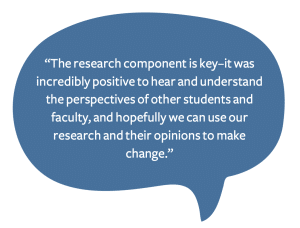 Volunteers ranging from 9th to 12th grades participated in weekly meetings from late January to the end of school in June. This group of students and I formed a youth-adult partnership where we designed a research process that sought input from the student body, from recent graduates, and from faculty. We also explored what other area high schools were doing for their PLPs.
Volunteers ranging from 9th to 12th grades participated in weekly meetings from late January to the end of school in June. This group of students and I formed a youth-adult partnership where we designed a research process that sought input from the student body, from recent graduates, and from faculty. We also explored what other area high schools were doing for their PLPs.
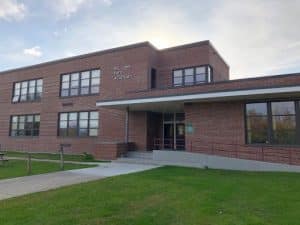 Like many schools in Vermont, BFA Fairfax has been developing and refining our PLP process in accordance with Vermont Act 77, the Flexible Pathways Initiative. The goal of PLPs in Vermont is to allow students to be able to develop their individual voice and agency in their own education, but at BFA Fairfax we had never even asked the students what they thought should be in a PLP. An eloquent quotation by scholar Cook-Sather (2002), “there is something fundamentally amiss about building and rebuilding an entire system without consulting at any point those it is designed to serve” (p. 1), provided the epiphany we needed to get a youth-adult team established. The results of the joint research partnership process itself indicate that the student participants experienced boosts in their own agency, their “voice,” and their self-efficacy.
Like many schools in Vermont, BFA Fairfax has been developing and refining our PLP process in accordance with Vermont Act 77, the Flexible Pathways Initiative. The goal of PLPs in Vermont is to allow students to be able to develop their individual voice and agency in their own education, but at BFA Fairfax we had never even asked the students what they thought should be in a PLP. An eloquent quotation by scholar Cook-Sather (2002), “there is something fundamentally amiss about building and rebuilding an entire system without consulting at any point those it is designed to serve” (p. 1), provided the epiphany we needed to get a youth-adult team established. The results of the joint research partnership process itself indicate that the student participants experienced boosts in their own agency, their “voice,” and their self-efficacy.
Student Voice
Student voice is the idea that schools or organizations invite the insight and opinions of students in a variety of ways. This can be through school organizations such as Student Council, or when students are allowed choice and interest-based learning in classrooms and courses. Quaglia et al. (2020) note that “fostering student voice teaches young people the responsibilities required to be a citizen in a democratic society”(p. 8). This is important, because “when students experience voice in school, they are more likely to develop a sense of self-worth, be engaged in learning, and have a sense of purpose” (p. 19). When students experience voice, it can improve their academic motivation and self-efficacy, and their individual and collective agency (Quaglia et al., 2020).
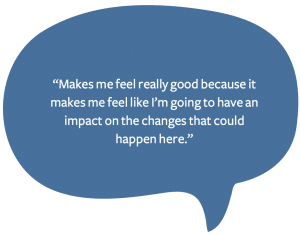 One way to foster student voice is through youth and adult collaborative teams. The Vermont organization UP for Learning provides tools and resources for schools to create and support youth-adult teams. The Youth-Adult Partnership Roadmap to Agency is one such tool. The “Roadmap” defines agency as what happens when youth and adults join together in learning and decision-making and students begin to take an active role in the choices in their lives. Student voice is a key component of this partnership. The roadmap rubric uses four sections to describe the components in youth-adult partnerships:
One way to foster student voice is through youth and adult collaborative teams. The Vermont organization UP for Learning provides tools and resources for schools to create and support youth-adult teams. The Youth-Adult Partnership Roadmap to Agency is one such tool. The “Roadmap” defines agency as what happens when youth and adults join together in learning and decision-making and students begin to take an active role in the choices in their lives. Student voice is a key component of this partnership. The roadmap rubric uses four sections to describe the components in youth-adult partnerships:
- What we believe about youth and adults as partners (mental models),
- Power dynamics,
- Communication/collaboration, and
- Decision-making and shared responsibility.
These components are defined along a continuum from the beginning of “Youth as recipients” to the end goal of “Youth and adults as full partners.”
The UP for Learning Roadmap to Agency is intended as a driver for organizational change. The implication is that the change begins when the youth-adult partnerships take shape. Our team used the Roadmap to understand, assess, and monitor our student and adult research.
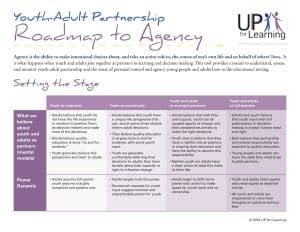
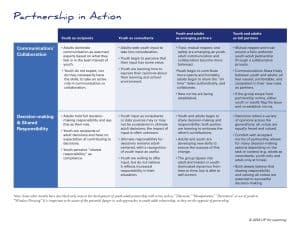 The student participants in our research group reflected during and at the conclusion of our project. The excerpts throughout this post are direct quotations from students that describe how their experience in the research increased their individual and collective agency, efficacy, and voice.
The student participants in our research group reflected during and at the conclusion of our project. The excerpts throughout this post are direct quotations from students that describe how their experience in the research increased their individual and collective agency, efficacy, and voice.
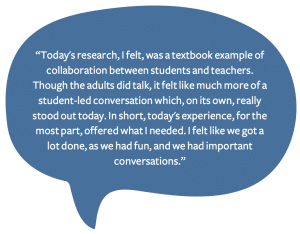
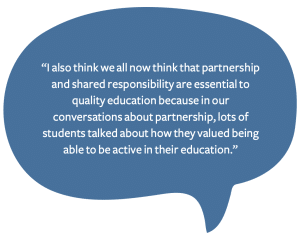
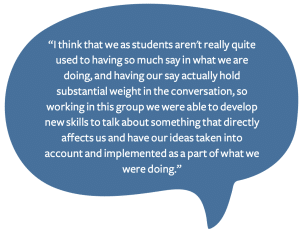
These student quotations show that when students are invited to participate in youth-adult partnerships, their experiences mirror that described by previous scholarship. When student voice is invited and when students are included on collaborative youth-adult teams, their own voice, agency, and leadership are strengthened (Mitra, 2006; Quaglia et al., 2020).
The youth-adult team made recommendations for changes to BFA’s PLP process and offered ideas for increasing student voice and agency across the student body overall. These desired next steps and changes or revisions to the PLP will continue to be a work in progress, and hopefully will affect the culture at BFA long-term. We will continue to monitor and track student engagement with their PLPs.
Lessons Learned
Our research provided valuable information as to how youth can contribute to the body of knowledge and understanding generated through empirical research that in turn contributes to transformational change within a school.
The following lessons learned summarize the research:
- Student participants demonstrated greater agency at the conclusion of the research period.
- Inclusion of student voice was inspiring and engaging for me as the adult researcher.
- It is imperative that student voices are included if we want to make changes to the systems and structures that impact them.
- Youth-adult partnerships can be powerful ways to increase agency for students and create actionable change.
- Youth-adult partnerships may be time-consuming to develop, but the insight and inclusion of student voice is worth it.
- Using UP for Learning’s Roadmap to Agency helped guide the process.
Final Thoughts on Student Voice and Agency
The scholars of democratic education and critical pedagogy such as Freire (2018, 1970) and Cook-Sather (2002) remind us that those of us who work in education have an obligation to include the voices of the students with whom we work in any change initiatives. The inclusion of students in this research was crucial to the power and viability of the outcomes.
The student participants gave evidence of their own increased voice and agency, and the recommendations resulting from the research provided practical revisions to BFA’s PLP system, which will be explored in my next blog post. This research will continue to influence the culture of BFA Fairfax, emphasizing the importance and role of student voices in their own education. I encourage scholars, practitioners, evaluators, and systems analysts to consider integrating youth-adult partnership processes in their future work. The inclusion of the voices of those affected is invaluable.
References
Cook-Sather, A. (2002) Authorizing Student Perspectives: Toward Trust, Dialogue, and Change in Education. Educational Researcher, 31(4), 3-14.
Freire, P. (1970, 2018). Pedagogy of the Oppressed. (Republished). Bloomsbury Academic.
Mitra, D. (2006). Increasing student voice and moving toward youth leadership, The Prevention Researcher, 13(1) 7-10.
Quaglia, R., Fox, K., Lande, L., & Young, D., (2020). The power of voice in schools. ASCD.
UP for Learning. (2021, November 1). Empowering youth and adults to reimagine and transform education together. https://www.upforlearning.org/
Vermont Agency of Education. (2021). https://education.vermont.gov/
Learn More
- It Starts with Us: An Exploration of Teachers as Self-Directed Leaders
- CBE Starter Pack 1: Students are Empowered Daily
- Building Habits of Success with the BEST Self-Direction Toolkit
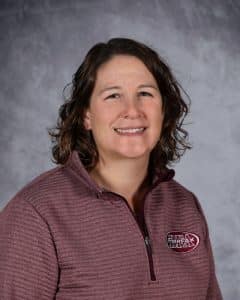 Jensen Welch is a veteran high school mathematics teacher with 20 years of classroom experience. As a member of the leadership team at Bellows Free Academy in Fairfax, VT, she has collaborated on the shift to proficiency-based personalized learning, including proficiency-based graduation and personalized learning plans for all students. She just completed her Doctorate of Education in Educational Leadership at Southern New Hampshire University. She believes every student can and wants to learn.
Jensen Welch is a veteran high school mathematics teacher with 20 years of classroom experience. As a member of the leadership team at Bellows Free Academy in Fairfax, VT, she has collaborated on the shift to proficiency-based personalized learning, including proficiency-based graduation and personalized learning plans for all students. She just completed her Doctorate of Education in Educational Leadership at Southern New Hampshire University. She believes every student can and wants to learn.